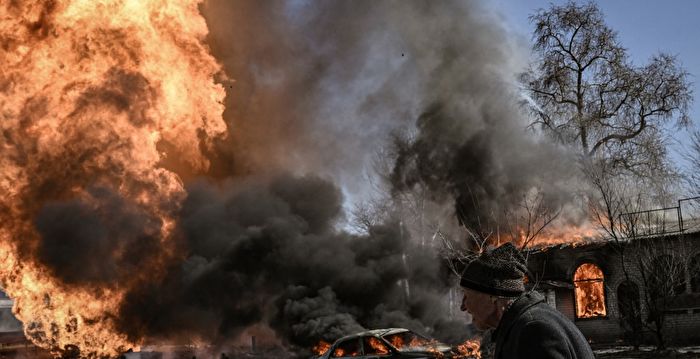[Epoch Times, March 28, 2022](The Epoch Times reporter Zhang Ting comprehensive report) As Ukrainian troops are fighting on the front lines to stop the Russian army from attacking, another battle is starting in China’s cyberspace. Mandarin-speaking Ukrainians are on the offensive on Chinese social media platforms, posting information about the Russian invasion to break down the propaganda walls on Chinese social media and state media to show the Chinese people what is really happening.
The Ukrainians are translating the latest developments in the war into Chinese, including information on casualties and analysis, and posting them on accounts on popular social media networks such as WeChat and Weibo.
According to the South China Morning Post, Ukrainian internet celebrity Masha has joined the information war on Chinese social media.
Masha has been posting videos about the situation in her hometown of Kostiantynivka, in the eastern region of Donetsk. After leaving Kyiv, she was reunited with her parents there.
“In my hometown, when the air-raid sirens sounded, people needed to take shelter in the ground,” Masha said in fluent Chinese in a video posted on Weibo, TikTok and Xigua Video.
“There’s not enough bread, all the banks are out of cash… People can’t buy food without cash. It looks like this place is dying,” she said.
Martha studied Chinese and literature at Taras Shevchenko National University of Kyiv and also spent nine months in China. Her “Life at War” video has garnered over 1 million views and she now has over 600,000 followers.
Writer, musician and artist Ivan Semasiuk, 42, is writing articles and documentaries — published in Chinese and other languages on social media platforms around the world — to explain the history of Ukraine and Russia .
Shivrenko: Break the propaganda wall and hope that Beijing will not support the Russian invasion war
According to the South China Morning Post, 32-year-old Ukrainian Roman Khivrenko said information on the Russian-Ukrainian war provided by Chinese social media platforms and state media was heavily influenced by Russia.
“We want to break down the propaganda wall and show the Chinese what’s actually going on,” said Shivrenko, who studies international relations at Renmin University of China in Beijing.
For Ukrainians like Shivrenko, part of the resistance is fighting propaganda, Nanzao said. He said they did not expect anything from the Chinese people, but he hoped that Beijing would “not support Russia’s all-out war against Ukraine.”
China has consistently refused to condemn Russia’s actions in Ukraine or to define Russia’s attack on Ukraine as an invasion. There is growing concern in the West that Beijing could help Moscow bypass sanctions and provide Russia with military equipment. The US media “Washington Post”, “New York Times”, CNN and the British media “Financial Times” all quoted US officials on March 13, saying that since Russia invaded Ukraine, Russia has turned to China for drones, including drones. military equipment and support. In addition, Russia has also asked China to provide additional economic assistance. U.S. President Joe Biden made it clear to Xi during a recent video call with Xi that any substantial support from Beijing for Russia would have consequences.
The CCP’s use of state media to amplify propaganda against Russia and censor anti-war and pro-Ukraine rhetoric has also attracted Western media attention. The New York Times said that what Chinese netizens saw was a war very different from what many parts of the world have seen. This practice is keeping the Chinese public away from the truth while sowing the seeds of confusion.
The fog of disinformation grew thicker when state media described Russia’s war as an anti-fascist effort, the report said. After the Russian Defense Minister announced in early March that it would host the first international anti-fascist conference in August, China’s CCTV published a brief report, and then created a related hashtag on Weibo. The hashtag has been hit 650 million times in 24 hours and has been used by 90 media outlets. Many commentators in China refer to Ukraine and the United States as fascist countries.
In February, a group of prominent Chinese university professors jointly published an open letter on WeChat condemning Russia’s invasion of Ukraine. But the open letter was quickly withdrawn.
Browsing foreign social media can hear overwhelming anti-war voices, while public opinion online in China looks almost overwhelmingly supportive of Putin. “The New York Times” said that there are certainly more than one voices of the Chinese people on this matter. Some anti-war voices were popular on Chinese social media in a short moment, and some became more than 100,000 views in one day. WeChat “popular”. But before they could be heard by the world, they were quickly censored and disappeared into the “404” mass grave of online speech.
The Associated Press said what the CCP has allowed online and what it has asked the media to publish is a clear indication of how the party wants the public to view the war.
Putin underestimates Ukrainian resistance
Analysts say the Russian attack has strengthened Ukraine’s national identity and prompted people to defend their country differently.
“The Russian invasion had this overwhelming effect, cementing the national identity of the Ukrainian, it Inspired patriotism among the younger generation.”
Nanzao also said that Hong Kong-based defense analyst Liang Guoliang agreed. Liang Guoliang said that Russian President Vladimir Putin underestimated Ukraine’s resistance driven by a sense of national identity.
Responsible editor: Li Qiong#
